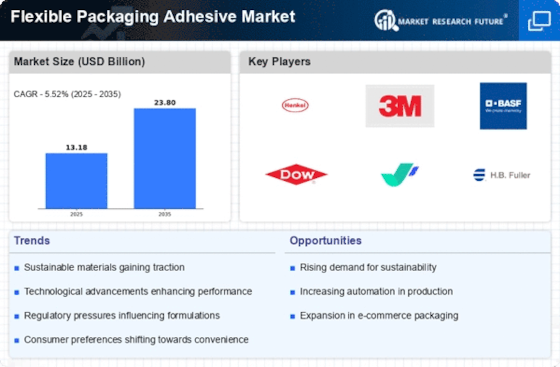Top Industry Leaders in the Flexible packaging adhesive Market

The flexible packaging industry, synonymous with convenience and sustainability, thrives on the invisible power of adhesives. This market is a competitive arena where top players jostle for market share. Let's delve into the strategies, key factors, and recent developments shaping this dynamic landscape.
Strategies Shaping the Game:
- Innovation Blitzkrieg: Companies like Henkel, H.B. Fuller, and Dow are developing bio-based, solvent-free, and high-performance adhesives to cater to eco-conscious consumers and stringent regulations. 3M's focus on pressure-sensitive and optically clear adhesives is another innovative gambit.
- Acquisitions and Collaborations: Mergers and partnerships are accelerating growth. Henkel's acquisition of Technovit expanded its portfolio, while Dow's collaboration with Sika Automotive bolstered its presence in the automotive packaging segment.
- Regional Play: Expanding into high-growth regions like Asia-Pacific is crucial. Companies like Bostik and Sumitomo Chemical are aggressively investing in production facilities and distribution networks in this region.
- Sustainability Gambit: Eco-friendly offerings are becoming a market differentiator. Companies are investing in bio-based materials, reducing solvent use, and developing recycling solutions to tap into the growing demand for sustainable packaging.
Key Factors Dictating Market Share:
- Product Portfolio: Offering a diversified range of adhesives for various applications, from food to medical packaging, is crucial. 3M's diverse portfolio allows it to cater to a wider customer base.
- Technological Prowess: Continuous investment in R&D to develop innovative and sustainable adhesives gives companies a competitive edge. H.B. Fuller's focus on solvent-free and hot-melt adhesives is an example of this strategic advantage.
- Production Capacity and Geographical Reach: A robust global production and distribution network ensures efficient supply and market penetration. Henkel's extensive network spanning 68 countries gives it a significant advantage.
- Brand Reputation and Customer Relationships: Building trust and long-term partnerships with packaging converters and food brands is vital. Dow's strong brand recognition and established relationships with major food companies give it a head start.
List of Key Players in the Flexible Packaging Adhesive Market
- H. B. Fuller
- Henkel
- Bostik
- Lubrizol
- BASF
- DSM
- Hunstman
- 3M
- Eastman
- Evonik
- Ashland
- Wacker Chemicals
- Dow Chemical Company
- Morchem
- Inktech
- Mitsui Chemicals
- Sika
- ExxonMobil Chemical
Recent Developments:
September 2023: Bostik launches a new e-commerce platform for its flexible packaging adhesive products, catering to the growing online demand.
October 2023: A major fire at a key resin supplier disrupts the supply chain, leading to price hikes and temporary shortages of specific adhesives.
November 2023: The US Food and Drug Administration approves a new, bio-based adhesive for medical device packaging, opening new avenues for sustainable solutions.
December 2023: Henkel and Dow sign a memorandum of understanding to collaborate on developing adhesives for recyclable packaging, aiming to close the loop on plastic waste.
January 2024: A new research report predicts the rise of "smart adhesives" in the flexible packaging market, with integrated sensors and functionalities to enhance product traceability and safety.










